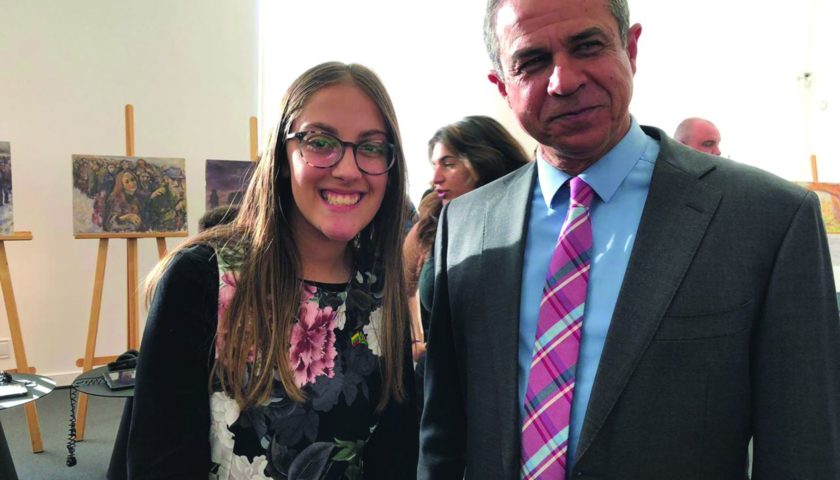Inside Operation Brothers, the covert, mass evacuation of Ethiopian Jews from of the Sudan
By Chandrea Serebro
Daniel Limor is the unsuspecting hero – not that he didn’t choose a position of leadership, having nurtured strong decision making skills since the age of 16 when he made Aliyah from Uruguay alone. His family couldn’t go at the time for various reasons, but they did soon follow three years later, when Daniel was entering the Israeli Defense Force for his national service. But in that time, Daniel had to fend for himself, become an adult overnight, making decisions that would affect his life going forward, decisions that were not always easy ones to make alone.
“Once you start your life at a young age, you have to make your own decisions. At that time, there wasn’t the type of communication that we have today, like smartphones, Whatsapp, email, telephone – so I had to make some decisions. Maybe this made it easier for me later on to have the strength and the knowhow to make other, bigger decisions. As you grow older, your decisions change, and grow with you.” And, until a hero chooses the mantle of leadership and becomes a hero in the eyes of others, he finds himself, accidentally, in the direct line of a life course that will lead him to greatness. And when he does find recognition by others, well, that’s when a Hollywood movie is made about him.
“Every step in my life was a question of leading something. The army, the service, the missions I participated in or lead. When I retired, I created a factory and built it from scratch, and lead it and grew it. It might be that it is difficult for me to be under the command of someone else, so I try and be in charge, but it is more than that. I can accept leadership if I respect the person – which isn’t always easy. There is always someone in a higher position than you, and you might need him some day down the line. ”
But still, Daniel doesn’t believe there is such a thing as a natural born leader. “I think it is a choice you make if you want to lead. For me, I began in the army when I chose to go on to commander courses as an officer, and I took that responsibility, I accepted that choice.” Firmly of the belief that it was his life choices that brought him to where he is today, Daniel does admit that sometimes, once the ball of life is rolling, things can become engrained in who you are. “Once you start something, and you understand that you can do it, then maybe it becomes second nature. But I still believe it is not destined by birth.”
Daniel found himself in charge of one of the most intriguing Mossad operations operated by Israel that few people know about to this day. Operation Brothers was the covert, mass evacuation of Ethiopian Jews from the Sudan, where they found themselves stuck, displaced, in the midst of a civil war – by way of a luxury diving resort. It was a beautiful, European-owned luxury retreat that had been abandoned for various reasons, but still a resort lapped by the waves of the Red Sea, “a wonderful world apart” stated the brochure for the resort, named Arous, “the diving and recreation centre of Sudan”. “The fish came to nibble on the divers’ masks,” said Daniel, who lead Operation Brothers for Israel’s Mossad. The story of the daring Mossad rescue is set to become a Hollywood movie, and Daniel himself consulted with the filmmakers.
But, ever the accidental hero, Daniel doesn’t believe he was pivotal in having played a hand – a decisive hand – in any big, life-altering event. “The emigration of Ethiopian Jews was an event, yes, an historic event for the Jewish people, for the State of Israel. But I chose to take it on. I was offered the possibility of doing it and I took it. I lead the operation in the first stages, commanding a team in difficult conditions. But I don’t know about me being instrumental in life-changing events.”
The Ethiopians at that time, he says, were not a desperate people who needed freedom. “It is true that they needed freedom. They were leaving a regime that was dictatorial and cruel, and they were limited in their movements. As Jews, they suffered a bit more than the others of the society, but everyone suffered. In 1979, when I was nominated to be in charge of this operation, the regime in Ethiopia was very tyrannical. But why did I do it? Because I was given the opportunity.” Daniel had always had a big admiration for Jews that lived in countries where they were persecuted and limited in their movements and their beliefs, their neighbours trying to convert them to their religion, be it Christianity or Islam. Here were the Ethiopians, whom the church was always trying to convert. And they managed to preserve their Jewish identity in very difficult conditions. That motivated and inspired me.”
With this sense of admiration that he felt towards the people he was helping, Daniel gave them “all that I could give. My everything.” And, he says, they impacted his life as well, and he came out of the whole endeavour changed, too. “Because many things happened, and I understood that you have to take risks if you want to achieve something worthwhile or make a change. And yes, those risks might be final.” Daniel believes that he had “some luck” that he came out of it alive and well. “But I did learn a lot of things. And everything I do today is partly because of those events in which I participated in the Sudan almost 40 years ago. It left a mark. I’m not traumatised though. On the contrary, it prepared me for the next stages of my life.”
Today, Daniel heads up NPO Nachshon, the Israeli Educational Institute for Social Leadership, an apolitical group of private individuals who have undertaken the mission to create an educational institute for promoting social leadership based upon values, care, and commitment for the future of the Israeli society. “When considering the youth of today, I like to think that this is where I might be instrumental. About 23 years ago, I created, along with some friends, the pre-military school of leadership Nachshon.” Daniel describes it as offering an intensive one year pre-army programme where the youth, boys and girls, are given many of the things that they missed in secondary school where “they were so focused on passing exams and achieving highest academic results”.
“We want to show them that the Israeli society can be improved, and that there is much that they can do. They can become leaders in change.” During the programme, the kids are taught everything that there is to know about Israeli society, through meeting with every faction of Israeli society – from the Bedouin to the ultra-orthodox in Jerusalem. And they learn to know the country. By walking, learning to orientate themselves in the field through navigation.” And how to live together. They are a micro cosmos of Israeli society from all the Jewish tribes. After a year, they are able to arrive at the army with a better understanding of how to deal with the things that life may throw at them. “We don’t give them answers that sound like rules. We show them the reality, and they come to their own conclusion.” And that is what being a leader of leaders is all about – even if you’ll never admit it.




